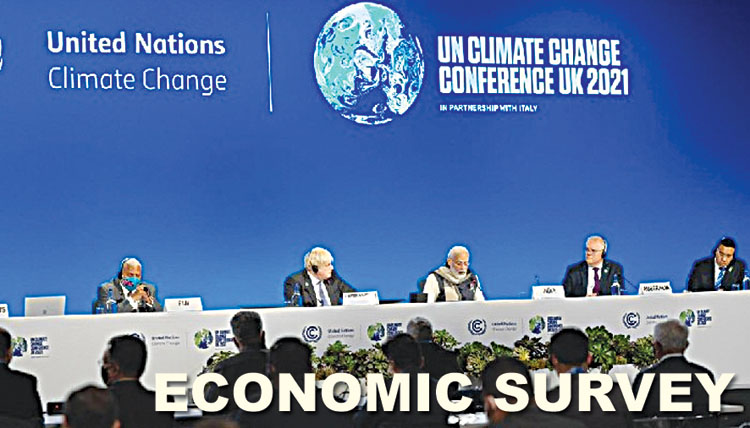In 2021, India continued exercising significant climate leadership at the international stage under the International Solar Alliance (ISA), Coalition for Disaster Resilient Infrastructure (CDRI) and Leadership Group for Industry Transition (LeadIT Group), the Economic Survey said. The International Solar Alliance signed a Memorandum of Understanding with UNFCCC at COP 26 to support ISA membership in developing a roadmap for, and implementing, their respective NDCs under the Paris Agreement. The ISA is mandated to facilitate mobilization of USD 1 trillion in solar investments by 2030 for massive scale-up of solar energy deployment, the Economic Survey 2021-22 said. The Strategic Plan of the ISA for 2021-2026 identifies three key global issues – Energy Access, Energy Security, and Energy Transition. In this regard, ISA has launched eight thematic programmes to address the above issues and an overarching programme to facilitate mobilization of affordable finance for large-scale deployment of solar energy across ISA membership. ISA supports its membership across four pillars encompassing programmatic support, capacity building and ecosystem readiness, risk mitigation instruments, and analytics and advocacy.
In November 2021, Prime Minister Modi launched the joint Green Grids Initiative- One Sun One World One Grid (GGI –OSOWOG) at the World Leaders’ Summit in Glasgow. It aims to create a globally inter-connected green grid, building upon existing regional grid infrastructure, which will enable solar energy generation in regions with high potential and its evacuation to demand centres. A joint GGI-OSOWOG Secretariat is being planned to be established at the ISA Secretariat to mobilize political support and render technical support for the initiative. The ISA has attained a Permanent Observer Status at the UN General Assembly. The Coalition for Disaster Resilient Infrastructure (CDRI): India’s call for promoting disaster resilience of infrastructure through the CDRI has been receiving global attention. Since CDRI’s launch in September 2019, its membership has expanded to 28 countries and seven multilateral organizations, with several member countries committing to provide technical assistance and financial resources. In addition to India’s seed funding of USD 70 million, the United Kingdom, United States and the Netherlands have pledged GBP 1 million, USD 9.2 million and 100,000 Euro respectively for CDRI’s programmes and projects. In March 2021, the PMs of India, UK, Italy and Fiji launched the third International Conference on Disaster Resilient Infrastructure (ICDRI), which discussed key global issues around resilience of critical infrastructure sectors such as power, telecommunications and health as well as urban infrastructure systems and disaster risk financing. In November 2021, the Prime Ministers of India, UK, Australia, Fiji, Jamaica and Mauritius launched the Infrastructure for Resilient Island States (IRIS).
This is a dedicated initiative for Small Island Developing States (SIDS) that provides quality technical and financial services to make SIDS infrastructure resilient to climate change and disaster events. India has pledged USD 10 million, while Australia and the UK have pledged AUD 10 million, GBP 7.3 million respectively for the IRIS initiative. Further, CDRI has launched two other initiatives. CDRI’s Global Flagship Report on Disaster and Climate Resilient Infrastructure aims to engage and focus global attention on the critical and multi-faceted challenges posed to disaster and climate-resilient infrastructure. DRI Connect is a “network of networks” enabling stakeholder access to knowledge resources and collaborative opportunities with their peers and other actors. These initiatives are in addition to CDRI’s ongoing programmes on enhancing the power sector’s resilience in Odisha and the global study on disaster resilience of airports. Leadership Group for Industry Transition (LeadIT Group): LeadIT was launched by India and Sweden, with the support of the World Economic Forum at the UN Climate Action Summit in New York in September 2019, as one of the nine action tracks identified by the UN Secretary-General to boost climate ambitions and actions to implement the Paris Agreement.
In November 2021, the Joint Ministerial Statement released at the Leadership Summit called countries and companies to come out with roadmaps for deep reductions in emissions across all heavy industries and value chains in the coming decade. Lifestyle for Environment (LIFE): In November 2021, PM Modi proposed a One-Word Movement in the context of climate: LIFE – Lifestyle for Environment, at the COP 26 in Glasgow. This movement calls for coming together with collective participation, to take lifestyle for environment forward as a campaign and as a mass movement for environmentally conscious life style in a manner that revolutionizes many sectors and diverse areas such as fishing, agriculture, wellness, dietary choices, packaging, housing, hospitality, tourism, clothing, fashion, water management and energy.

